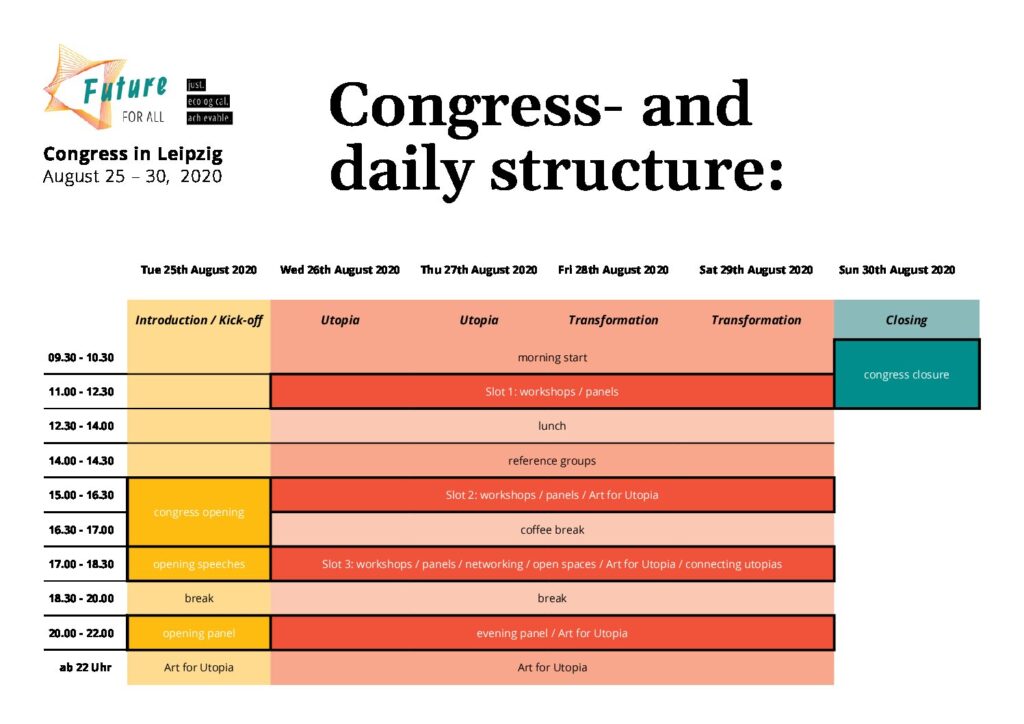Overview
The entire programme overview is on this site. All events such as workshops and panels are listed in there. All workshops that are conducted in English are listed in rooms 3 to 8. You will soon find a neat table which illustrates the general daily structure. Further down on this site you find an overview on the 15 different thematic tracks and the overaching arts and cultural programme.
Here you can find an overview of the english part of the programme as PDF Document.

Thematic tracks
The congress program will we structured along the following tracks. We’ll be glad if you follow them in your contribution proposal. The PDF below provides more information on different topics.
This track is on transformation towards a just, climate-friendly and democratic food system: Food production, processing and distribution is run collaboratively. Consumption and using what was formerly considered “waste” contribute to the common good. Everyone has access to healthy and culturally diverse diets with more plant-based protein sources. The responsibilities for (care) work are divided equally and contribute to healthy ecosystems.
In 2048, work and activities have been fundamentally changed and redistributed. All people have time at their disposal, opportunities to shape their lives, access to desired activities, social security, and participate in society and politics. How can we change work so that the participation of all, a fair distribution and an orientation towards ecological, gender-equitable, social and democratic needs can be guaranteed? What could be initial projects into a good future for the entirety of work?
Digitality refers to the interweaving of “analog” and “digital” realities and questions the tension between humans and technology. Digital technologies open up a lot of possibilities for action, and thus room for social vision, but also come with risks. Can digital technologies be made useful for social utopias?
What does utopia in the context of school look like? How can education be conceptualized and implemented in a way that contributes to a solidarity-based way of living? How can it support a good life for all?
With the climate crisis, the socio-ecological challenges of energy-intensive and privileged lifestyles have become obvious. Imagine 2048: People decide how to produce, use and distribute their energy according to their needs and socio-ecological feasibility.
The financial system in 2048 is democratically controlled and stable. It serves the socio-ecological transformation and social welfare. What is the architecture of this financial system and what role do money and finances play in a society without growth and profit orientation? How is the social sphere financed and how does the financial system contribute to this? How do we manage international financial flows without discrimination? Do we need a monetary and financial system at all and if not, how could it be deconstructed?
Imagine no longer having to fight against closed borders and everyday exclusions. Instead, you are part of a world with open societies.
In 2048, the colonial injustices that have existed for centuries will be history – materially, financially, technically, ecologically and ideologically.
In 2048, the right to housing for everybody is a reality and no one can enrich themselves on the housing market. Profit seeking has been overcome and everyone can live well. But what does “good living” mean in the future?
How do we get around in 2048? What are the ideas on mobility of different people across the globe? What does just and ecological mobility for all look like? How is it designed and by whom?
How is society organized in 2048? Are markets simply regulated or have they been abolished? Which structures are in place to combat discrimination? Has the state been changed or replaced? Is consumption still linked to achievement or has (compulsory) work largely been deconstructed? Which relationship is there between big societal tipping points and gradual processes of change?
In 2048 there are social guarantees which ensure everyone’s existence and social participation in any place one chooses to live. How must social justice be defined and politically fought for, so that no one can be excluded from social guarantees? Which “beacons” light the way to their implementation? Which political strategies, concrete projects and alliances are necessary and possible? What international perspectives are there?
In 2048, there is a network of democratically organised companies that base their production on the needs of the people and which are rooted in their local communities. Cooperation instead of competition is the motto. What role do the state, the market, planning, property, money or other means of exchange play in a solidarity-based, sustainable economy? What is the relationship between global, continental, regional and local production processes? How can we describe the relationships with other people and our environment that arise from this economy? How are mental infrastructures created which motivate solidarity-based action at the global level?
In 2048, people have created a future worth living. In order to achieve this, they developed their relationships and their ability to love, as well as strengthening their empathy for all living things and the world around them. How can we create such a culture of community?
The art and culture program of the congress combines theory with practice, makes thematic intersections visible and creates alternative approaches. The artistic formats should show a variety of perspectives and open spaces of imagination beyond the norm. The aim is to convey sustainable ideas and concepts with the help of artistic strategies. We want to develop a diverse, inclusive and transdisciplinary program that experiments with new formats and encourages people to shape visions as well as cross-genre boundaries and to perceive global contexts. This requires as many perspectives as possible that strengthen diversity, cultural exchange, heterogeneity and plurality.
We are primarily looking for participatory formats that can be communicated locally, in small groups, or digitally in the event of persistent restrictions. We are also looking for discursive formats such as lecture-performances, streams and workshops.

